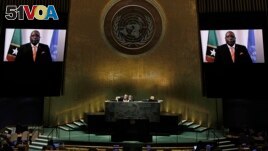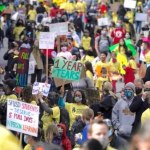29 September 2021
At this year's United Nations General Assembly meeting in New York, several leaders voiced their approval of reparations.
They gave their support to a system of payments from countries with historical links to slavery and colonialism. Officials from South Africa, Cameroon, Saint Kitts and Nevis, Saint Lucia, Cuba and Malaysia urged the creation of a reparations system.

Prime Minister of Saint Kitts and Nevis, Timothy Harris, in a pre-recorded message, addresses the 76th session of the United Nations General Assembly, Friday Sept. 24, 2021, at UN headquarters. (Peter Foley/Pool Photo via AP)
But large countries like the United States, Britain and Germany mainly did not comment about the issue.
Philip J. Pierre is the prime minister of Saint Lucia. He said, "Caribbean countries like ours, which were exploited and underdeveloped to finance the development of Europe, have put forward a case for reparations for slavery and native genocide." He added that he wanted the problem to be treated seriously and with urgency.
But reparations payments have not been among the issues discussed by major world powers.
U.S. President Joe Biden did not talk about reparations in his speech to the U.N. But earlier this year, the Biden administration said it supported studying reparations for Black Americans. The office of the U.S. Ambassador to the U.N., Linda Thomas-Greenfield, who is African American, did not comment on the recent reparations discussions to The Associated Press.
South African President Cyril Ramaphosa did discuss the issue. He called the time of slavery "one of the darkest periods in the history of humankind."
Slavery in what would become the United States started more than 400 years ago in some of the British colonies. In the U.S., slavery was outlawed during the U.S. Civil War which ended in 1865.
The debate about reparations has continued for many years. It has not gained much interest in the past 30 years. However, reparations have gained support in some cities and local governments since the 2020 death of George Floyd, a Black man, in Minneapolis, Minnesota.
Carla Ferstman is an international law expert who studies reparations at the University of Essex in Britain. She said the U.N. talks are a big step forward for the reparations movement around the world.
Reparations could come in many forms. There could be direct financial payments to individuals. Development aid could be offered to countries. Colonized land, art and cultural objects could be returned. The correction of policies and laws that continue to discriminate could also be carried out. And apologies that include wiping away national heroes who are no longer in favor are other possibilities.
"One needs to be sensitive to what is important and how to best rectify," Ferstman said.
The Durban Declaration against racism
The latest discussions on reparations came as the U.N. honored the 2001 conference against racism in South Africa. It produced what is called the Durban Declaration.
Last week, a U.N. group approved a resolution that said there had been some progress on the issue. But it also said there had been a rise in discrimination and violence towards people of African ancestry. Other groups facing mistreatment included refugees, the displaced, those with disabilities, the Roma in Europe, the young and the old.
The resolution said there should be a way for descendants to seek fair "reparation or satisfaction for any damage suffered." But the resolution stopped short of demanding that nations must pay reparations to countries their governments have harmed.
The United States, Britain and Germany were among several countries that did not attend the meeting honoring the Durban Declaration. The U.S. boycotted the meeting 20 years ago over the Israeli-Palestinian conflict.
Germany's president, in his General Assembly address, also did not talk about reparations. But Germany is one of the few countries that have offered to pay money to make up for its past actions.
Earlier this year, Germany officially recognized the killing of tens of thousands of people in Namibia as genocide. It offered to provide 1.1 billion euros over 30 years for projects involving the people affected. But Germany did not call the payments reparations.
I'm Dan Novak.
Sally Ho reported this story for The Associated Press. Dan Novak adapted it for VOA Learning English. Mario Ritter, Jr. was the editor.
_____
Words in This Story
descendant — n. someone who is related to a person or group of people who lived in the past
exploit — v. to use in a way that helps you unfairly
sensitive — adj. understanding the feelings of other people
rectify — v. to correct something that is wrong











